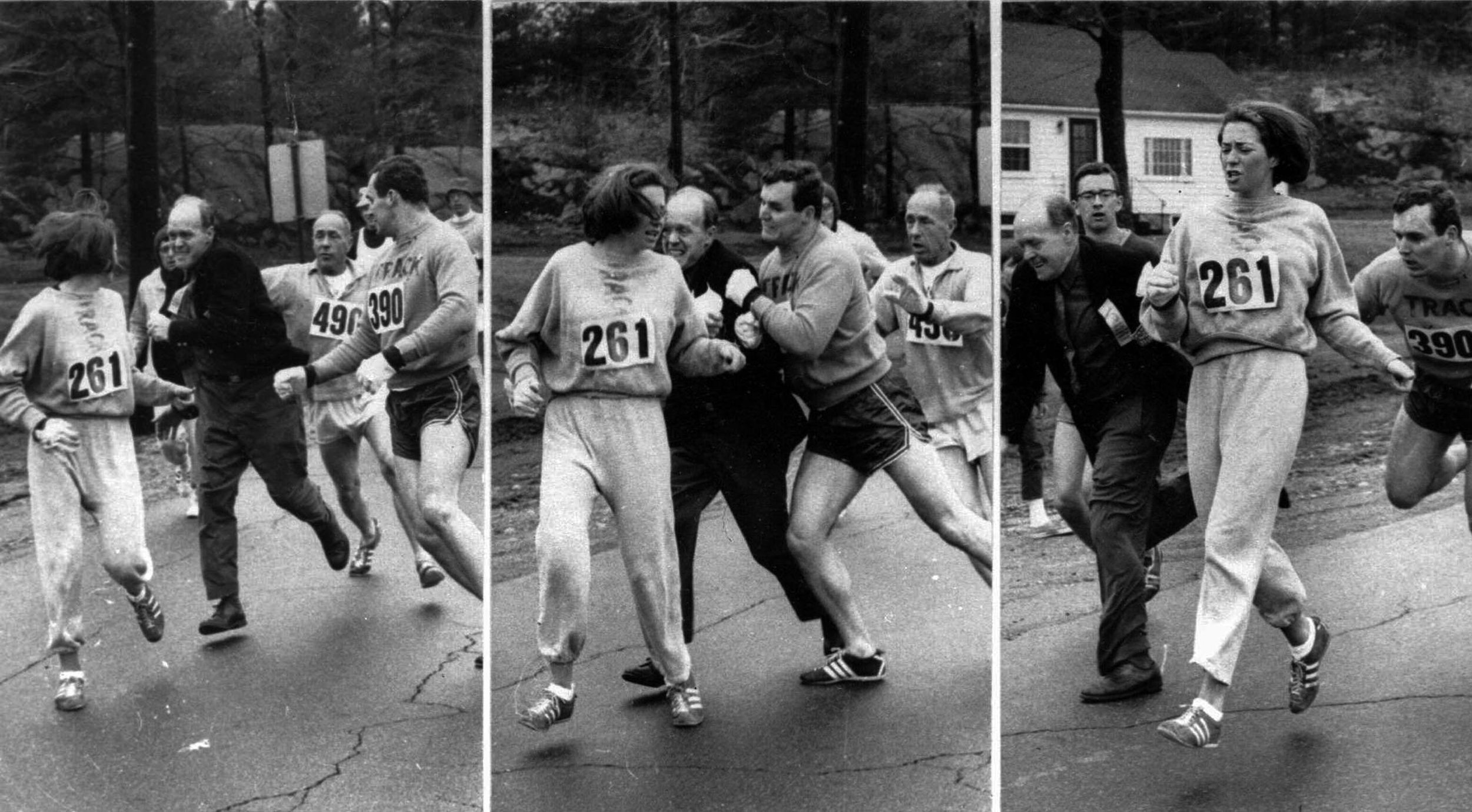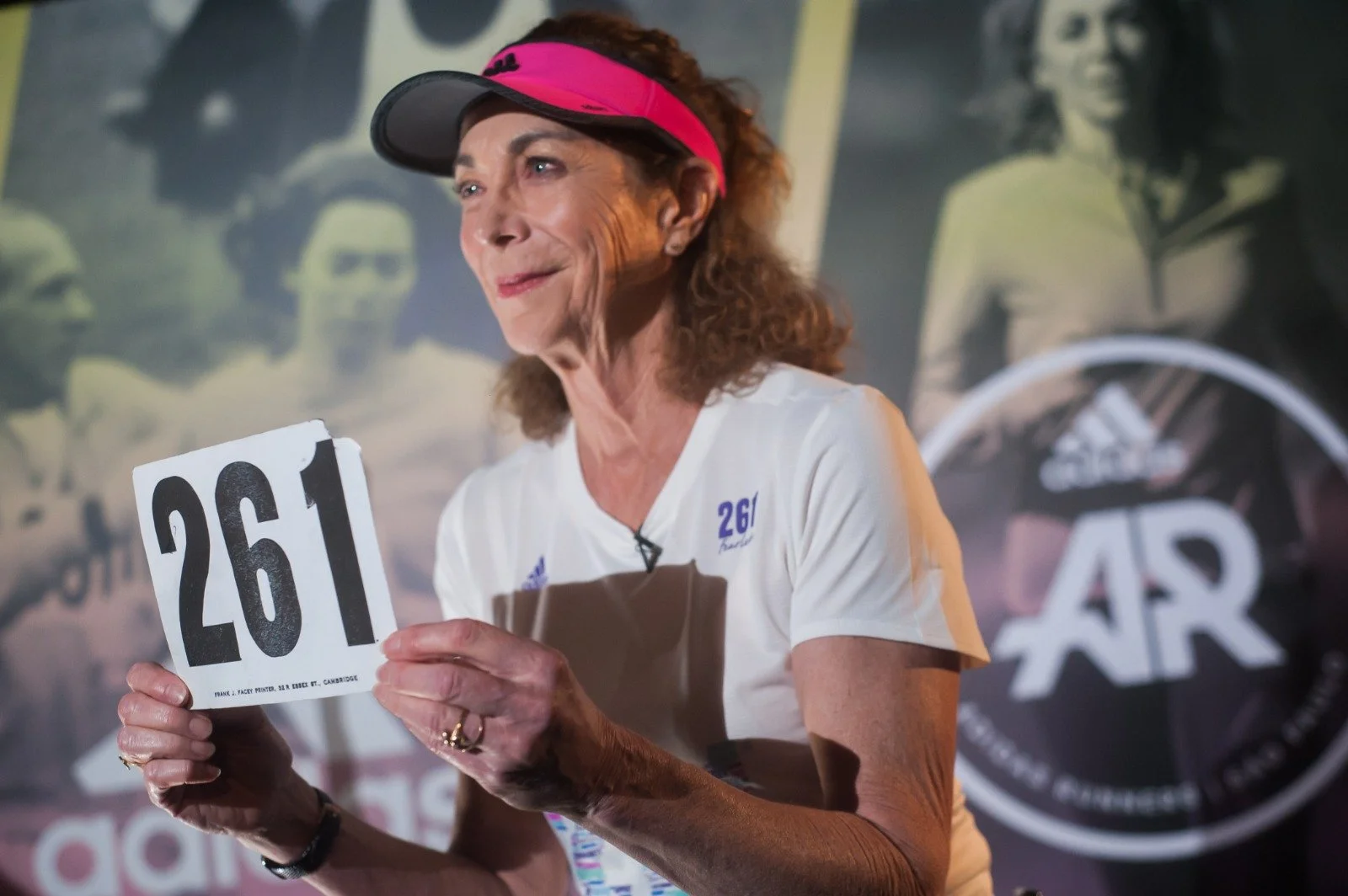Kathrine Switzer
A personal note: I have known Kathrine Switzer and her husband, Roger Robinson, for over 30 years. She is a dear, long-time friend. We’ve had many adventures at races, and having coffee, brunch, dinner together, or just hanging out. One of my favorite memories was being part of the relaunch of Avon Global Women’s Running in 1998. Not only did I cover the announcement, but I also ran in Central Park with Kathrine and other women running pioneers. It was part of a photo shoot for Avon. And it was unforgettable! I also stayed with Kathrine and Roger in their NYC apartment for the event. We were three friends having a grand time. This interview is personal for me. It is an honor and a pleasure to have been part of it.
Photo credit: Hagen Hopkins
Say the name Kathrine Switzer and many people aren’t sure who she is. Say, “the woman who was accosted during the 1967 Boston Marathon because she was running in an event for men only,” and it’s an image people recognize and remember.
Kathrine’s journey to that infamous event began years before, growing up in Northern Virginia with her parents. Kathrine credits her Army Colonel dad for starting her on that path. Kathrine was 12 and heading to high school. She very much wanted to be a cheerleader. Her dad talked her out of it by saying, “Cheerleaders cheer for other people. You want them to cheer for you.” Kathrine’s dad suggested she run a mile every day. Field hockey appealed to her and she knew running was a big part of it. So she started running and began to feel good as she logged each mile.
Kathrine continued to run at Syracuse University, where she was studying journalism and used KV Switzer as the byline for her articles. Kathrine was running three miles a day. She asked to run with the men’s cross-country team because there was no team for women. The men enjoyed having Kathrine run with them and she logged a lot of miles.
She began running with Arnie, a volunteer manager with the team. He regaled Kathrine with stories of running the Boston Marathon. A seed was planted. The 1967 Boston Marathon became the goal for Kathrine and Arnie. Kathrine had no idea what a historic run Boston would be. It became the spark for her life path. That spark grew into Kathrine's mission to help women in sports and especially women runners.
Jock Semple trying to pull Kathrine off the Boston Marathon course in 1967.
After the infamous 1967 incident, Kathrine worked with Sara Mae Berman and Nina Kusick to officially include women in the Boston Marathon. Nina won that first year–1972. Fifty years ago, in 1975, Kathrine ran, set a personal record, and finished third. Kathrine’s trophy was broken and when Jock Semple, the man who tried to pull her off the course in 1967, presented it to her, he was very apologetic.
Kathrine’s life path had come into focus, helping women realize, “I can run, too.” Fred Lebow approached Kathrine and Nina and asked them to help with a women-only marathon, put on by Crazy Legs. Fred thought maybe six or eight women would run a marathon. Not with Kathrine and Nina in charge! They plastered the city with flyers, dropped them off at YWCAs, stores, everywhere. Seventy-eight women showed up, which was beyond their expectations—women encouraging women and giving gifts that the runners would enjoy. The formula worked and Kathrine was on her way. She wrote a proposal to Avon, the women’s cosmetics company, to pique their interest in sponsoring women’s races. The man in charge wasn’t ready for women’s running but asked Kathrine to join the company. She worked very hard to persuade him. The first event was held in Atlanta in 1978. From there, 27 countries, 1 million women, and 400 events became Avon Global Women’s Running. Kathrine led the charge and it was a success, opening doors for women all over the world.
1972 Women’s Boston Field. 7 of 8 runners:Nina Kuscsik #2, Kathrine Switzer #6, Elaine Pedersen #3, Ginny Collins #5, Pat Barrett #4, Frances Morrison #10, Sara Mae Berman #1
Kathrine also worked very hard to have the women’s marathon included in the Olympics. The International Olympic Committee (IOC) was hard to convince. But, in 1984, the dream came true. Joan Benoit Samuelson won the first women’s Olympic Marathon in Los Angeles.
Through the years, Kathrine has written books, commentated for major races, spoken to groups all over the world, and has inspired women everywhere. At the Paris Olympics last year, Kathrine was the honorary starter for the women’s marathon. Kathrine called it, "heart- stopping.
In the 1967 Boston Marathon, Kathrine’s bib number was 261. Her number became an inspiration for women and stood for being fearless. That’s how 261 Fearless, the non-profit Kathrine co-founded in 2015, was born. Kathrine wanted to help women throughout the world. Women who might not have the opportunity to run or walk … or become “fearless.” One group of women touched Kathrine deeply at a 261 Fearless event in Austria. Afghani women–15 of whom had escaped the Taliban–ran the race. They were proud of their accomplishment. Helping women, many who have never had the opportunity, is Kathrine’s focus. She continues to open doors for women and to encourage them through running and to help them feel empowered, no matter their circumstances.
Kathrine Switzer embodies the Hebrew phrase “Tikkun Olam.” It is an important tenet of Judaism and means “repair the world.” Making life better for others, helping others, whether one person at a time or many people. This has been Kathrine’s life work. It began when she and Arnie decided to run the Boston Marathon in 1967, a life-changing moment for Kathrine that was to become a springboard for women everywhere.
Note about the author: Freddi Carlip, a founding member of Starting Line 1928, is a runner, writer, former president of the Road Runners Club of America, the RRCA’s Miss Road Manners, and editor/publisher of Runner’s Gazette, America's first running newspaper.





